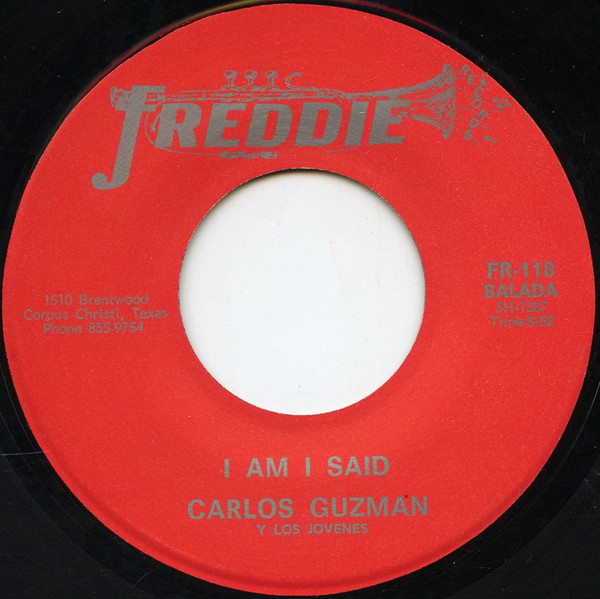Carlos Guzman Y Los Jovenes - I Am I Said Momentos
Table of Contents
Download
Filename: carlos-guzman-y-los-jovenes-i-am-i-said-momentos.rar- MP3 size: 8 mb
- FLAC size: 72.2 mb
Tracks
| Track | Duration | Preview |
|---|---|---|
| Momentos | 2:18 | |
| I Am I Said | 3:52 |
Images

Catalog Numbers
FR-118Labels
Freddie RecordsListen online
- online luisteren
- online anhören
- lyssna på nätet
- lytte på nettet
- kuunnella verkossa
- ascolta in linea
- escuchar en línea
- écouter en ligne
- ouvir online
Formats
- Vinyl
- 7"
- 45 RPM
- Single
Companies
| Role | Company |
|---|---|
| Pressed By | Houston Records |
About Carlos Guzman Y Los Jovenes
His given name is Margarito, and he was born in Chihuahua, a small community that, according to the Texas State Historical Association, was located 6 miles west of Mission, on Feb. 22, 1940. Carlos describes that occasion as a
bitter, cold day.
He grew up with 11 siblings, plus three other children that joined the family after the death of a relative.
When he wasnt singing at home, in the fields or at canals, his father would take him to the programas de aficionados (talent shows) at local theaters. He loved to sing Isidro Lopezs
Mala Cara.
Carlos sung it so often that he started being referred to by that title within the theater crowd.
One day when he was 16, Carlos and his friends went to an armory in McAllen to see Isidro Lopez y su orquesta. Lopez was ill that night and began losing his voice. One of Carlos friends approached Lopez, and blurted out that his buddy could sing his tunes. Lopez replied,
Tell him I will pay him to come over here (on stage) and sing a couple of songs.
I was scared like crazy,
Carlos remembers.
He gave me a $20 bill. That was a lot of money. I said, Wow!
He sounded strong enough that a musician from Los Continentales offered him a paying gig that night. That was the first band with which he regularly played.
Carlos then got to meet chromatic accordionist Oscar Hernandez through Armando Hinojosa Sr. He accepted an opportunity to record with Oscar Hernandez y Sus Alegres Del Valle for Del Valle Records around 1960.
In the early 1960s, he would still go by his birth name. That changed when his orquesta played at the Ranchito Club in San Antonio one evening.
Some patrons asked the name of the groups singer. So the MC asked Carlos what his name was.
I said, Eduardo, Carlos, whatever,
Carlos said.
So, he used the name Carlos. He told some of the girls, His name is Carlos. So, before you know it, the girls were like, Hey, Carlos!
A new faction emerged from musicians who participated in Carlos earlier collaborations with Hernandez. They were known early on as Carlos Guzmán y su conjunto. They would become better known as Carlos Guzmán y Los Fabulosos Cuatro.
Los Fabulosos Cuatro,
Carlos said.
Great musicians, great friends and el nombre (that name) fit perfectly. Because during that time, which was the early 60s, the Fab Four from England came on board. So, as they were innovators in their own way, so were Los Fabulosos Cuatro. They were so advanced in their music talent that other musicians would freak out.
The original four members were Carlos on vocals, Ramiro
Snowball
De La Cruz on guitar, Armando Hinojosa Jr. on bass, Mel Villarreal on accordion and Balde Muñoz on drums.
Los Fabulosos Cuatro were a little bit ahead of the times,
Muñoz said.
Snowball brought a lot of experience from different genres to the band. When he brought the guitar, instead of the bajo-sexto, which is usually used in conjunto music, that was something not too often used. They were all great arrangers; everybody would contribute. The voices were great; it was Carlos, Snowball and Mel great vocal harmonies.
Muñoz says the name change also reflected that they had gone beyond traditional conjunto music.
There was conjuntos, and there were orquestas, with a four or five horn section, and we came in the middle (from those two styles) with a different sound,
he explained.
Muñoz would later leave the crew to go serve his country, and Juan Hinojosa stepped in to be the new drummer.
In between touring, the ensemble worked on a new album for Bego Records in 1964. They just needed one final track to complete the release.
They decided to go with an E.J. Ledesma composition that had previously been recorded by Los Cruisers. Carlos notes that they went with it since it had a simple melody and arrangement.
None of them expected what happened next.
It caught fire on all the radio stations,
Carlos said.
That was the beginning of a long journey for Carlos Guzmán y Los Fabulosos Cuatro.
That canción was
Vestida De Blanco,
which is still Carlos most requested song.
Their success continued when they released Tiempo De Llorar (1967) on Bego Records. The LP featured strong interpretations of the title track
96 Tears
and
Shes About A Mover.
Carlos said
96 Lagrimas,
as it was known because it was sung in Spanish, became a surprise hit in Mexico.
Real Name
- Margarito
Name Vars
- Carlos Guzman y Los Super Jets
- De La Guz
